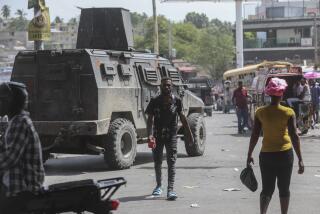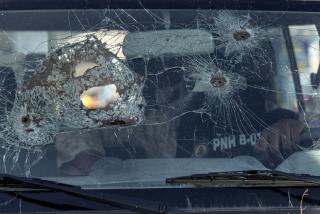U.N. Completes Sierra Leone Rescue Mission
- Share via
NEW YORK — In a daring rescue mission, the United Nations brought to safety Sunday all of its peacekeepers who spent two months trapped in a small base surrounded by rebel soldiers in Sierra Leone.
The action brought relief at U.N. headquarters in New York and marked a new, robust stance for the world organization’s military force in the West African nation torn by civil war.
“Everyone pulled together, and it worked,” said Fred Eckhard, spokesman for U.N. Secretary-General Kofi Annan.
Eckhard said the mission was so successful that the besieged peacekeepers even managed to escape with all of their equipment, including computers.
“When they left, the [peacekeepers] insisted on taking everything of value with them,” he said. “The forces worked together.”
The key element was surprise.
Heavily armed U.N. troops using helicopter gunships and transport helicopters moved into the stronghold of Revolutionary United Front rebels in Kailahun in the eastern part of the country at dawn Saturday as the 222 trapped Indian peacekeepers and 11 military observers broke out of their encirclement.
They were met by sporadic gunfire from the rebels.
Some military observers and troops who were ill were flown to Freetown, the capital, aboard the helicopters. Others, along with their rescuers, moved slowly down a muddy, rutted road through a rain forest to the heavily fortified town of Daru, which the U.N. controls.
U.N. gunships provided cover during part of the dangerous 50-mile trek.
Seven peacekeepers were wounded, one seriously, during a series of firefights.
U.N. officials in Sierra Leone said there were “numerous victims” among the rebels, but they were unable to provide casualty figures.
U.S. Hails Success of Operation Kukri
P.J. Crowley, a spokesman for the White House National Security Council, welcomed the rescue.
“Obviously, we’re pleased that the U.N. conducted a bold and well-executed operation to free the peacekeepers,” Crowley said in Thurmont, Md., next to Camp David, where Middle East peace negotiations are taking place.
He predicted that the action could be expected to strengthen both the U.N. peacekeeping force and the Sierra Leonean army.
“We continue to work with the U.N. and other regional countries on ways to make the peacekeeping mission in Sierra Leone as effective as possible,” he said.
Operation Kukri, named after a sharp Indian knife, began when troops from Ghana, India and Nigeria, supported by British transport helicopters and Indian helicopter gunships, launched their surprise attack.
The rescue force had a major advantage. Even though the base had been under siege since May, the rebels never disarmed the peacekeepers.
By prearranged signal, the peacekeepers broke out of the base and caught rebel troops by surprise. Some rebels fled into the jungle. Others chased after and shot at the peacekeepers, who returned fire.
Vehicles containing the peacekeepers’ equipment quickly lined up into a convoy.
A second blocking force of U.N. troops, meanwhile, had moved up the road from the south, where they met the convoy near the town of Pendembu.
Both groups spent an uneasy night in that town. Sunday morning, most of the freed peacekeepers were flown by helicopter to Daru while the rescue mission provided cover with gunfire.
A Morale Boost for Beleaguered Troops
The mission was a major morale boost for U.N. peacekeeping troops in Sierra Leone. In May, the United Nations’ effort to restore order in the country was seriously threatened when the rebels seized 500 peacekeepers.
After delicate negotiations, including mediation by Liberian President Charles Taylor, the hostages were released.
The Indian peacekeeping contingent and 11 military observers were trapped later by the rebels.
Annan said in a statement issued Saturday that the rescue mission was necessary because intensive diplomatic and political efforts had failed and resupplying the peacekeepers had become impossible because of the “increasing threatening posture” of the rebels.
Mandate to Disarm Rebels Strengthened
Since the massive taking of hostages in May, the United Nations has moved to increase its strength in Sierra Leone. The 13,000 troops now on duty constitute the largest peacekeeping force that the world organization has assembled.
Some military officials on the ground predicted after the bold mission that the U.N. will move more robustly to oust rebel forces from the countryside in an effort to fulfill its mandate of disarming the RUF ahead of elections.
Over the years, the rebels have killed and maimed tens of thousands of civilians in their bid to gain power and have scuttled several peace accords.
More to Read
Sign up for Essential California
The most important California stories and recommendations in your inbox every morning.
You may occasionally receive promotional content from the Los Angeles Times.













